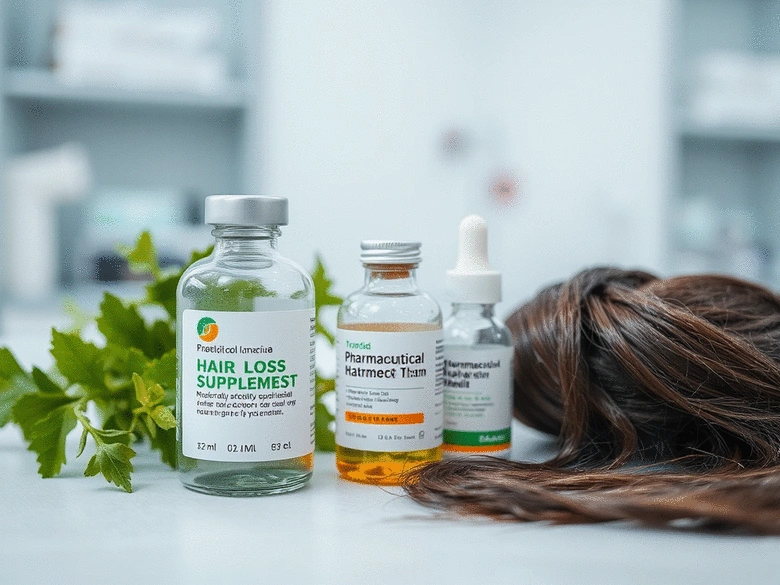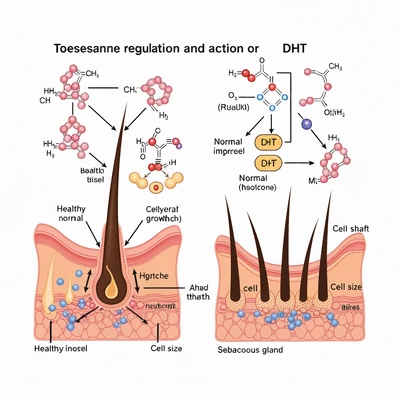Nutraceuticals Overview
- ✓ Dietary supplements, natural products
- ✓ Support hair health, enhance growth
- ✓ Ingredients: Biotin, Zinc, Omega-3s
- ✓ Growing consumer preference for natural options
Have you considered how your choice between nutraceuticals and pharmaceuticals can significantly influence your hair health? Understanding these distinctions is not just informative; it's essential for making empowered decisions on your hair care journey.
This visual compares key characteristics and ingredients of nutraceuticals and pharmaceuticals for hair loss, highlighting their different mechanisms and consumer trends.
The hair loss treatment market is rapidly evolving with significant shifts:
Critical factors for selecting effective treatments:
When it comes to tackling hair loss, it's essential to understand the difference between nutraceuticals and pharmaceuticals. Nutraceuticals typically include dietary supplements and natural products used to support hair health, while pharmaceuticals are scientifically formulated medications designed to actively treat conditions. Both play significant roles in the realm of hair loss treatments, and knowing what each offers can empower you to make informed decisions.
For instance, ingredients like biotin and zinc are popular in nutraceuticals due to their supportive roles in hair health. On the pharmaceutical side, you have powerful options like minoxidil and finasteride, which directly target hair loss mechanisms. Understanding these differences can help guide your choices when seeking effective treatments. For a deeper dive into current practices and research, you can explore insights from recent studies on hair loss treatments.
Let's dive deeper into the definitions and characteristics of nutraceuticals and pharmaceuticals specific to hair loss. Nutraceuticals often contain vitamins, minerals, and herbal extracts that aim to enhance hair growth and overall hair health. Key ingredients include:
Conversely, pharmaceuticals like minoxidil work by increasing blood flow to hair follicles, while finasteride blocks the conversion of testosterone to DHT, a hormone linked to hair loss. This distinction helps illustrate how these treatments function differently to combat hair loss. For more information on both traditional and emerging medications, you can refer to resources like Dermatology of CT.
The landscape of hair loss treatments is rapidly evolving, particularly with a noticeable shift toward natural supplements. Many consumers are increasingly interested in holistic approaches that align with their lifestyle choices. This trend reflects a broader preference for products perceived as safer and more aligned with personal health.
Moreover, the growing e-commerce market significantly influences how these products are marketed and purchased. More people are seeking convenient online options, which makes it easier to access both nutraceuticals and pharmaceuticals. Have you noticed how online reviews and testimonials play a vital role in your decision-making process? They certainly do for many others, shaping perceptions of effectiveness and trust.
Dihydrotestosterone, or DHT, is a key player in hair loss, particularly in androgenetic alopecia, commonly known as male or female pattern baldness. This hormone is a derivative of testosterone and can shrink hair follicles, leading to thinner hair and eventual loss. Understanding DHT's role is crucial for anyone looking to address hair loss effectively.
Treatments targeting DHT, like finasteride, have shown promising results in slowing down hair loss and even promoting regrowth in some individuals. It's fascinating to see how science continues to uncover ways to combat this hormone's effects. If you're considering treatments, I encourage you to consult with a professional to discuss options that might work best for your unique situation! For a comprehensive look at how different treatments are impacting hair growth, an article in Wiley Online Library provides further details.
As we navigate the complex world of hair loss treatments, your opinion matters! What has been your experience with nutraceuticals versus pharmaceuticals?
Here are some common questions about nutraceuticals and pharmaceuticals for hair loss:
As we wrap up our exploration of the current landscape in hair loss treatments, it's important to reflect on the key insights we've discovered. The options for addressing hair loss have expanded significantly, with both nutraceuticals and pharmaceuticals playing crucial roles. By understanding the effectiveness and market trends of these treatments, we can make more informed choices for our hair health!
It’s clear that making the right choice involves a careful assessment of what works for you personally. The growing interest in individualized treatments signifies a positive trend towards better hair health solutions.
When considering hair loss treatments, it’s vital to lean on clinical evidence. While both nutraceuticals and pharmaceuticals can provide benefits, the effectiveness of each can vary widely. I encourage you to research ingredients and their proven effects to find what truly aligns with your needs.
By taking a balanced approach, combining the best of both nutraceuticals and pharmaceuticals, you can enhance your chances of achieving meaningful results in your hair care journey!
Engaging with others who share similar hair loss experiences can be incredibly helpful. I invite you to share your thoughts and feedback on your trials with nutraceuticals or pharmaceuticals for hair loss. Have you found a treatment that worked wonders for you? Your insights could help others in our community!
When we exchange stories, we create a richer understanding of what works. Let's build a supportive network where we can learn from each other's experiences and make informed decisions together!
The rise of e-commerce has dramatically transformed how hair loss treatments are marketed and purchased. Online platforms have made it easier than ever for consumers to access a wide range of products from the comfort of their homes, which is influencing their decisions in profound ways.
As we continue to see these trends evolve, it’s essential to stay informed about how they affect the availability and effectiveness of hair loss treatments. Together, we can navigate this landscape and find the best options for our unique hair health needs.
Here is a quick recap of the important points discussed in the article:
At What Causes Hair Loss, we unravel the complexities of hair loss with science-backed insights, empowering you with dermatologist-reviewed guides and effective solutions for your hair health journey.
Dermatologist-Reviewed Insights


